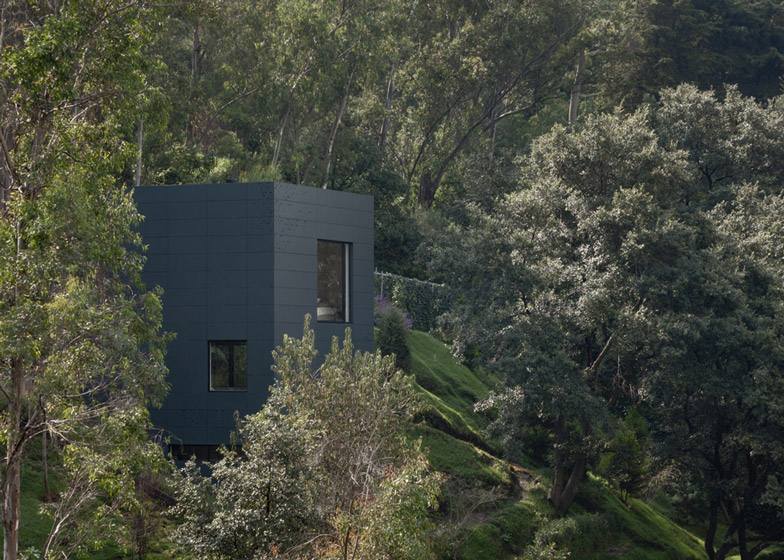Hundreds of perforations are dotted across the monolithic facade of this weekend house outside Mexico City by AS/D Asociación de Diseño.
The architects were inspired by the shapes of surrounding trees to create the patterns, which provide a simple relief across walls clad with Trespa rainscreen panels.
Named Casa Alta, the three-storey building has a tower-like form that is set into the sloping landscape of its valley setting.
"The building became an observation tower house and this allowed the perforated tree image to be better read from the facade," architect Fernando Velasco told Dezeen.
The building's entrance leads into a living room on the middle floor, while the kitchen and dining area is located below and the bedroom and bathroom can be found upstairs.
Stairs also lead up from the bedroom to a wooden deck on the roof. "We had to come up with a sliding deck which could open and close, but also have a minimum impact on the overall volume, said Velasco. "The deck slides closed over the bedroom to complete the wooden floor, resulting in a larger surface to enjoy the view."
See more projects in Mexico, including a house with a high-walled courtyard and a hotel of 20 separate cabins.
Photography is by Rafael Gamo.
Here's some more information from AS/D:
Casa Alta.
AS/D asociación de diseño
Located on a steep slope within a 1,500 square meter plot with magnificent views to the valley, the main structure of this weekend house consists of a 6m by 6m module in three levels with just 108 square meters and a roof deck overlooking the valley.
The structural walls made of striped exposed concrete make this house a monolith inserted in a steep topography highlighting discreet light penetration, as well as directed views towards the garden.
A staircase parallel to the site guides the user from the entry level to the outdoor platform below, the same way in which the house is interconnected from the lower level to the roof garden.
The site presents a difference in level of about 16 meters in one direction, offering magnificent views of the surroundings; the house is inserted at a specific level from which it optimizes different entry levels and the integration of the exterior space. A clear connection is generated throughout the 3 main levels of the projects: entry level, the levels of the house and the lower level platform containing the pool. The project is conceived as stacking program enclosing different uses on specific levels of the site.
The house works a vertical block organised by vertical circulation through a stacked staircase which connects the user to different levels and program having on the lower level the kitchen with dining area, the intermediate level or entry level the living room, the top level the bedroom and full bathroom, and above that the roof deck. The directed views are key to the project as per orientation of each level and space interconnection on the inside.
A platform on the lowest part of the site becomes the common space for relaxation, ending with the landscape intervention and programmatic experience. This platform of 200 square meters consists of a swimming pool, grill, outdoor dining tables, and lounge spaces, with views the valley as well as the river.
The design of the ventilated facade is conceived with the idea of somehow printing an abstract image of a tree, just as if the house would camouflage with the many existing trees from the site.
The façade evolves from the idea of digital pointillism where the image of a tree is digitalized with the same technique of the impressionist paintings, where the user is able to see the full image from a distance but as one gets closer it becomes a constellation of pixels which gives a unique texture to the house. This is achieved with 232 Trespa panels from which 40% are perforated using CNC technology for the fabrication and precision and placed on an aluminum sub-structure.
Casa Alta, is a subtle intervention to the site, context and vegetation, with a minimum footprint to allocate the basic needs for a weekend house. A house that becomes and observatory from the inside and a house of intervention from the outside. A house to enjoy the outdoors.
Type: Single family residence
Architectural design: AS/D asociación de diseño. Fernando Velasco + Paola Morales
Team: Santiago García de Letona, Fernando Polidura, Natalia Gomez, Piergianna Mazzocca
Construction: Punto y Raya Arquitectura y construcción + AS/D asociación de diseño
Facade: material: Trespa installation: Katorceespacios
Structure: Ing. Cesar Pérez Carbajal
Location: Huixquilucan Estado de México. México
Plot Area: 1,600 m2
Built Area: House. 108 m2, Platform 200 m2, services 30 m2
Project Year: 2010
Construction Year: 2011-2012
Site plan - click above for larger image
Ground and first floor plans
Second floor and roof plans
Axonometric diagrams - click above for larger image

